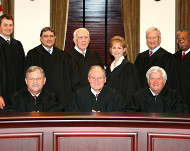8/18/2015
Mississippi Supreme Court Busts Lying, Ticket Quota CopHigh court in Mississippi says state trooper who issued 25 bogus tickets should never have been reinstated with full back pay.

A Mississippi Highway Patrol officer who issued bogus traffic citations to meet his ticket quota was fired on Friday by the state supreme court. All nine justices agreed that the department was right to terminate Sammy William Ray and that the state Court of Appeals was wrong to intervene to give him his job back, with full back pay.
Ray was a six-year veteran trooper in 2009 when a routine audit revealed that he had been responsible for an unusually high number of voided traffic tickets. This kicked off an investigation that uncovered the practice of writing "ghost" tickets. That is, Ray would pull over a motorist, and once he had the driver's personal information, he would add charges to the ticket control sheet that would pad his monthly ticket-writing statistics. Upon learning this, Ray's troop captain charged him with insubordination and falsification of records -- a firing offense. Ray was brought before an internal performance review board, which sustained the charges and recommended his termination. Ray appealed to an employment board.
Four motorists victimized by Ray appeared at the next hearing to tell their side of the story. Sandra Carpenter was given a citation for an expired inspection sticker, but she later learned that a seatbelt ticket was also placed on her record. Ray pulled over Joshua Ulmer for a seatbelt violation, then Ray after the fact issued him tickets for speeding and having an expired inspection. Kaci Patterson was pulled over and left without receiving any tickets, but she was later charged with speeding. Ray would void all of the bogus tickets to avoid detection, but they would still count toward filling his ticket quota.
"During the time I have been employed with the MDPS, I have written twenty to twenty-five tickets that may or may not be factual tickets," Ray said in a written statement. "These tickets were seatbelt violations. This was done to increase my ticket activity."
In a recorded interview, internal affairs investigator Creede Mansell asked Ray whether he wrote the bogus tickets because he was failing to meet his quota.
"Not really," Ray admitted. "I was just trying to play a numbers game. You know, just trying to stay out of hot water."
Ray said he gave in to the extreme pressure to issue a large amount of tickets out of "poor judgment." After he was fired, Ray decided to appeal by discrediting the four aggrieved motorists, saying there was no proof that they were among the twenty-five who received admittedly bogus tickets. The state's second-highest court agreed with Ray. The highest court, however, had a different view.
"Ultimately, we find that the department presented substantial evidence to support Ray's termination, and the Court of Appeals erred by reweighing the evidence and substituting its own judgment," the state Supreme Court ruled on Friday. "We find that Ray's due process rights were not violated... he was afforded an opportunity to be heard, and he indeed was heard."
The final ruling upheld Ray's firing. A copy of the opinion is available in a 120k PDF file at the source link below.


